Blandine Dancette’s testimony Professional handball player and gold medal winner at the Tokyo Olympics
Blandine Dancette, the handball player and medal winner at Tokyo and Rio, is an inspiring athlete who is very involved with young people. At the age of 36, she looks back at her career, its challenges and her career change. From her beginnings at the Nîmes HBC training centre to her Olympic title at Tokyo in 2021, her exceptional career reflects recent changes in women’s handball and also shows the remaining challenges.
Interviewed by Julie Mongard, Communications Officer, Sport and Citizenship, and Eva Jacomet, Head of EU Affairs, Sport and Citizenship.
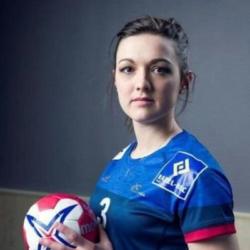
Can you tell us about your career?
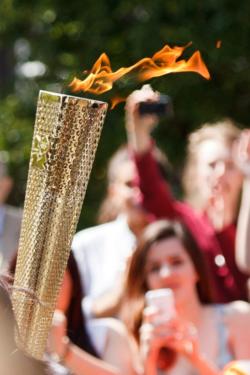 I started playing handball when I was 11 at Saint-Etienne. In 2005 I joined the training centre at Nîmes HBC, where I signed my first professional contract. This club gave me my first chance to be selected for the French team in 2009. Unfortunately, the club closed in 2016. I followed my career in Nantes, where I ended up with the European Champion title. At the same time, I had the honour of representing France 115 times and gained the gold medal at the Tokyo Olympics in 2021 and a silver medal in Rio in 2016.
I started playing handball when I was 11 at Saint-Etienne. In 2005 I joined the training centre at Nîmes HBC, where I signed my first professional contract. This club gave me my first chance to be selected for the French team in 2009. Unfortunately, the club closed in 2016. I followed my career in Nantes, where I ended up with the European Champion title. At the same time, I had the honour of representing France 115 times and gained the gold medal at the Tokyo Olympics in 2021 and a silver medal in Rio in 2016.
You have taken part in three Olympics. What do the Olympics mean to a top-level athlete? What special memories do you have?
The Olympic Games are very special, firstly as a celebration of sport, and also for athletes to meet each other. It is a unique and magical experience. We are also very proud to represent our country.
I remember my first Olympics in London, it was a dream come true for me to take part in this great sporting event, and the chance to meet other athletes. Then there were the Rio Olympics, where I enjoyed myself a lot on the court, in spite of some difficulties (injury). Winning the silver medal was a fantastic memory, especially as it was the first Olympic medal for French women’s handball.
These moments underline the importance of being united and well supported in order to win a medal. A competition is never straightforward, you have to keep believing until the end.
Your career began nearly 20 years ago. How has the attitude to women’s handball changed over this period?
Women’s handball has made a lot of progress and led the way in many areas, and has even inspired other sports. When I started, a lot of players were still semi-professional. When I arrived at Nîmes, it was the beginning of the professional era. This professionalisation was a major advantage, because it allowed us to spend all of our time training, playing and resting. Within the Federation we have also seen changes, such as equal prize money for men and women medallists, although there are still differences, including the daily allowances when I played. The two gold medals at Tokyo showed the Federation’s equitable investment in the men’s and women’s teams.
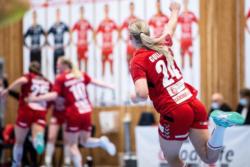
Today, women’s handball attracts more sponsors, salaries have increased, and there are more spectators at matches. More resources are available to women, almost as much as for the men. However, there are still inequalities, particularly in the way women’s sport is perceived and its treatment by the media. The media need to realise the importance of giving men’s and women’s sport equal treatment and funding. Elite female athletes should be given more recognition. In the French Championship, more needs to be done in covering the matches. Recent changes in the funding and visibility of women’s handball are already very positive!
Handball was the first professional women’s sport to adopt a collective agreement for the players, marking an advance in holidays, working conditions and maternity leave. What do you think of the way maternity is treated in this sport?
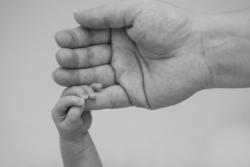 Handball was a forerunner in recognising maternity leave. The convention allows players expecting a baby to keep their salary for a year. Maternity is now less of a taboo subject than it was, although the benefits are confined to an elite few, because it is difficult to get back to the same performance level after a pregnancy. Clubs are beginning to understand this reality, and it is important that discussions continue so that plans to become a mother can go forward serenely and openly.
Handball was a forerunner in recognising maternity leave. The convention allows players expecting a baby to keep their salary for a year. Maternity is now less of a taboo subject than it was, although the benefits are confined to an elite few, because it is difficult to get back to the same performance level after a pregnancy. Clubs are beginning to understand this reality, and it is important that discussions continue so that plans to become a mother can go forward serenely and openly.
Do you think that clubs and teams are now more concerned about the players’ well-being? For example, there is more and more talk about menstruation and its impact on performance.
In conclusion, is there a social question in which you are particularly interested?
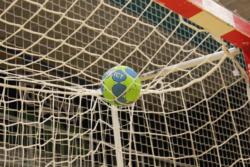
The question I care about is the access to sport for all, especially for girls in deprived areas and for persons with a disability. Sport should not be reserved for men or an elite. Nowadays there are more schemes in place so that women can take part in sporting activities and enjoy themselves doing sport.
Adapted Physical Activity (APA) is also changing to make adapted or para-sport available to persons with different types of disability.
This article was written as part of GAP Women, a European project aimed at eliminating gender inequalities in sport and promoting inclusive and sustainable sport. Find out more at: https://gapwomen.ufec.cat/.










 MEMBERSHIP
MEMBERSHIP CONTACT
CONTACT FACEBOOK
FACEBOOK